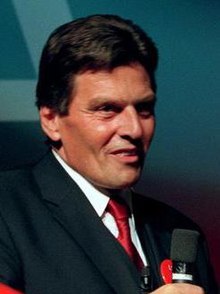Viktor Klima | |
|---|---|
 Klima in 1998 | |
| Chancellor of Austria | |
| In office 28 January 1997 –4 February 2000 | |
| President | Thomas Klestil |
| Vice-Chancellor | Wolfgang Schüssel |
| Preceded by | Franz Vranitzky |
| Succeeded by | Wolfgang Schüssel |
| Chair of the Social Democratic Party | |
| In office 9 April 1997 –28 April 2000 | |
| Preceded by | Franz Vranitzky |
| Succeeded by | Alfred Gusenbauer |
| Minister of Finance | |
| In office 12 March 1996 –28 January 1997 | |
| Chancellor | Franz Vranitzky |
| Preceded by | Andreas Staribacher |
| Succeeded by | Rudolf Edlinger |
| Minister of Public Economy and Transport | |
| In office 3 April 1992 –12 March 1996 | |
| Chancellor | Franz Vranitzky |
| Preceded by | Rudolf Streicher |
| Succeeded by | Rudolf Scholten |
| Personal details | |
| Born | 4 June 1947 Schwechat,Austria |
| Political party | Social Democratic Party |
| Profession |
|
| Signature |  |
Viktor Klima (born 4 June 1947) is an Austrian Social Democrat politician and businessman. He was chancellor of Austria from 1997 to 2000.
